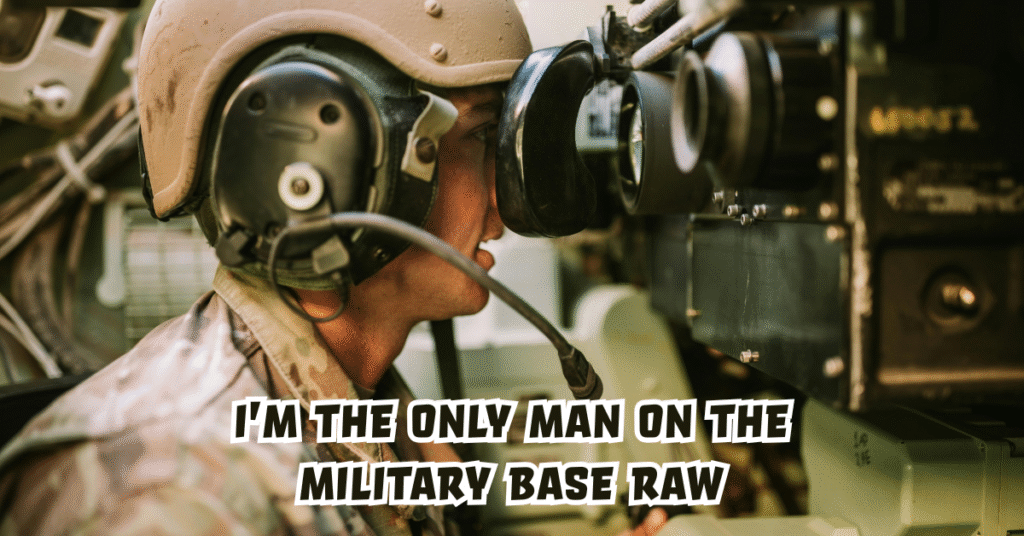The phrase “I’m the Only Man on the Military Base Raw” has emerged as a compelling and thought-provoking expression, blending elements of isolation, authority, identity, and resilience. At first glance, the wording may sound unusual or even cryptic, but beneath its surface lies a layered concept that sparks curiosity about its origins and interpretations. For readers seeking clarity, this article unpacks the phrase in detail by exploring its symbolic significance, practical applications, and broader cultural meaning. In its simplest explanation, the phrase refers to the experience of being singular—standing alone in an environment defined by structure, discipline, and raw survival. The “military base” symbolizes strict systems or institutions, while “raw” adds an element of unfiltered authenticity, hardship, or vulnerability. Whether interpreted literally or metaphorically, the statement invites exploration of themes such as solitude in leadership, masculinity in structured spaces, and the role of individuality within collective institutions.
Understanding this phrase is more than a linguistic exercise—it is an examination of how language captures emotion, identity, and human struggle. Across disciplines such as literature, philosophy, military history, and cultural studies, “I’m the Only Man on the Military Base Raw” offers a lens to analyze resilience and the tension between individual presence and institutional frameworks. This article traces its symbolic origins, breaks down possible applications, compares interpretations, and evaluates its contemporary relevance.
Origins and Linguistic Breakdown
The origin of the phrase may not be tied to a single author or historical event, but it reflects traditions of military storytelling, where individuals often emphasize survival, sacrifice, or solitude. The declaration of being “the only man” underscores a sense of isolation, echoing narratives of lone soldiers or solitary figures in harsh conditions. The “military base” element situates the phrase within a space of hierarchy, discipline, and order, often associated with masculinity, toughness, and endurance. Finally, the addition of “raw” transforms the statement into something deeper—it indicates unfiltered experience, hardship, or authenticity without embellishment.
From a linguistic perspective, the phrase employs dramatic tension. It juxtaposes “only man,” which emphasizes singularity, with “military base,” a setting typically crowded with uniformed individuals. This contrast makes the expression memorable, symbolic, and open to layered readings.
Symbolism and Interpretations
The phrase’s symbolism can be explored across multiple dimensions:
- Isolation – Reflects the experience of being alone in demanding environments, symbolizing solitude in structured spaces.
- Masculinity – Highlights societal expectations of toughness, endurance, and strength, especially within militarized frameworks.
- Authority – Suggests a figure of leadership, being the singular presence responsible for maintaining order.
- Authenticity – The word “raw” emphasizes honesty, unfiltered truth, and the stark reality of survival.
- Metaphor for Institutions – Beyond the military, it can represent standing alone in corporate, academic, or political structures.
As one cultural analyst put it, “Language like this captures both the harshness of survival and the pride of individuality within institutions.”
Psychological and Social Implications
Psychologically, the phrase touches on human emotions tied to isolation and resilience. Soldiers, leaders, and even civilians may identify with the sensation of being “the only one” facing challenges in unfamiliar settings. Socially, it represents the paradox of individuality within collectives. Even in spaces where conformity is required, individuals often feel the weight of singular responsibility or identity.
The concept also resonates with broader themes of alienation—how one can feel alone despite being surrounded by others. It is a reminder of the universal human struggle to balance belonging with individuality.
Cultural Applications
The phrase has cultural applications that extend beyond military contexts. Writers and artists may use it as a metaphor for resilience, while activists may adopt it to signify the struggle of standing alone for justice. In media, the statement could serve as a narrative hook for films or books exploring themes of survival or isolation. Additionally, in motivational discourse, it may be reframed as an empowering message about individuality and raw authenticity.
Comparison with Similar Expressions
| Expression | Core Theme | Context | Emotional Impact |
|---|---|---|---|
| I’m the Only Man on the Military Base Raw | Isolation, authenticity, resilience | Military/institutional | High – dramatic, symbolic |
| Lone Survivor | Endurance, sacrifice | Military narratives, survival stories | Inspirational but somber |
| Man Against the World | Defiance, individuality | Literary and cultural | Empowering, rebellious |
| Holding the Line Alone | Responsibility, defense | Military and leadership | Courageous, steadfast |
This table shows how the phrase shares roots with broader cultural narratives of solitude, yet distinguishes itself with its unique “raw” authenticity.
Relevance in Leadership and Management
In leadership studies, the phrase metaphorically applies to decision-makers who find themselves isolated at the top. Leaders often bear the weight of responsibility, much like being “the only man on the base.” The “raw” element highlights the unfiltered nature of leadership—filled with difficult choices, uncertainties, and vulnerabilities. In corporate or political spaces, such metaphors remind us that leadership often involves balancing resilience with humility.
Literary and Artistic Resonance
Writers often draw upon military language to evoke strength, order, or struggle. The phrase lends itself to poetry, novels, and films where characters grapple with solitude or authenticity. Artistic works that explore isolation, such as paintings or performances, may use this statement as a motif to reflect the raw intensity of standing alone in rigid environments.
As one novelist wrote: “Rawness lies not in the battle itself, but in the silence after—when only one remains to tell the story.”
Broader Societal and Philosophical Connections
Philosophically, the phrase reflects existential themes. To be “the only man” is to confront existence in its rawest form—where survival and meaning collide. It speaks to the human search for authenticity in an increasingly mechanized world. Societally, it represents the courage required to challenge conformity, reminding us that individuality persists even in the most structured institutions.
Practical Applications in Modern Discourse
| Domain | Application of the Phrase |
|---|---|
| Education | Used as a metaphor for students or teachers standing alone in pursuit of knowledge. |
| Military Training | Highlights resilience and authenticity as part of mental preparedness. |
| Corporate Management | Applied to leadership challenges, where responsibility often feels isolating. |
| Creative Industries | Serves as a thematic symbol in stories, films, or visual art projects. |
| Activism | Represents the struggle of standing alone for justice or reform. |
By transcending its literal meaning, the phrase has become a versatile tool across various domains.
Future Relevance of the Phrase
As society continues to evolve, expressions like “I’m the Only Man on the Military Base Raw” will find renewed meaning. In an era of digital work, isolation takes on new forms—individuals working remotely may feel like lone figures in sprawling systems. Similarly, in global politics, leaders often experience the raw solitude of decision-making. The phrase will likely remain a cultural marker for resilience, individuality, and authenticity in modern life.
Conclusion
The phrase “I’m the Only Man on the Military Base Raw” is not simply a string of dramatic words; it is a layered metaphor that reflects isolation, resilience, leadership, and authenticity. It captures the tension between individual presence and institutional systems, inviting readers to reflect on solitude and strength in their own lives. Whether understood in its literal military sense or applied metaphorically to broader human experiences, it remains a powerful linguistic construct. Its cultural, psychological, and philosophical implications ensure that it continues to resonate in modern discourse. Ultimately, it is a reminder that standing alone, though daunting, often reveals the rawest form of strength and truth.
FAQs
1. What does “I’m the Only Man on the Military Base Raw” mean?
It symbolizes isolation, resilience, and authenticity within structured environments like military or institutional systems.
2. Is the phrase literal or metaphorical?
It can be interpreted both ways—literally as a lone presence on a base, or metaphorically as isolation within institutions.
3. Why is the word “raw” important in the phrase?
“Raw” emphasizes authenticity, vulnerability, and unfiltered truth, giving the phrase its emotional and symbolic intensity.
4. How is this phrase used in modern contexts?
It is applied in literature, leadership studies, activism, and creative industries as a metaphor for resilience and individuality.
5. What is the broader significance of this phrase?
It reflects universal human themes of standing alone, balancing individuality with conformity, and embracing authenticity in hardship.







